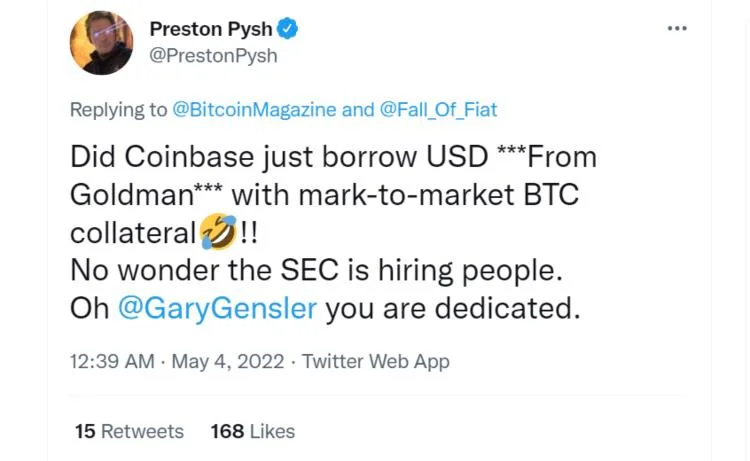Coinbase has taken out a loan from Goldman Sachs that is collateralized in Bitcoin, paving the way for others to follow.

Coinbase, America’s largest cryptocurrency exchange, has been revealed as the mysterious firm that obtained Wall Street’s first bitcoin-backed loan from Goldman Sachs.
As of 2021, Goldman Sachs manages $2.5 trillion in assets.
Bloomberg reported on Tuesday that Coinbase had taken out a Bitcoin-backed loan from Goldman as a way to strengthen ties between the crypto and trading worlds, with Coinbase Institutional head Brett Tejpaul stating that:
“Coinbase’s work with Goldman is a first step in the recognition of crypto as collateral which deepens the bridge between the fiat and crypto economies.”
The loan’s dollar value was not disclosed, but it was secured by a portion of Coinbase’s total holdings of 4,487 Bitcoin, which are currently worth around $170 million. The loan includes 24-hour risk management, but Coinbase must top up its BTC collateral if prices fall too low.
While Bitcoin- and other crypto-backed loans are common in the crypto industry, particularly on decentralized finance (DeFi) protocols, they are a curiosity in traditional finance, where crypto is regarded as too risky and volatile as collateral.
However, asset management firm Arca stated in a blog post published on May 2 that potential borrowers are looking for more such options. “[This loan] demonstrates institutions’ willingness to use new tools with old techniques,” it said.
“It is far more likely that Goldman is seeing a lot of demand for this type of transaction and is just testing the waters before making a bigger splash.”
The Bitcoin-backed loan sparked discussion on Twitter. In response to the loan, Bitcoin podcaster Preston Pysh tweeted on Wednesday, “No wonder the SEC is hiring people.”

Meanwhile, Coinbase CEO Brian Armstrong has outlined his vision for decentralized social media platforms enabling free speech. On May 2, he told the Milken Institute that Twitter, under new owner Elon Musk, has an opportunity to “essentially embrace using a decentralized protocol” that the platform could run on.
“I think freedom in all forms is worth defending and crypto, a lot of it, is about economic freedom. Freedom of speech is another version.”
Armstrong believes that a decentralized social media platform would enable content creators to set their moderation policies, and that access to all content would be democratized rather than algorithmically determined. This would prevent certain content streams on a platform from being stifled and allow users to see whatever they wanted.
If Twitter does not seize the opportunity, Armstrong points out that there are already teams working on DeSo, or decentralized social media platforms, where users can own their own identity on the platform.
Since 2019, Twitter’s founder, Jack Dorsey, has been working on Bluesky, a decentralized social media platform that operates independently of Twitter. Bluesky’s mission is to accelerate the adoption of technology in which “creators have control over relationships with their audiences and developers have the freedom to build.”

